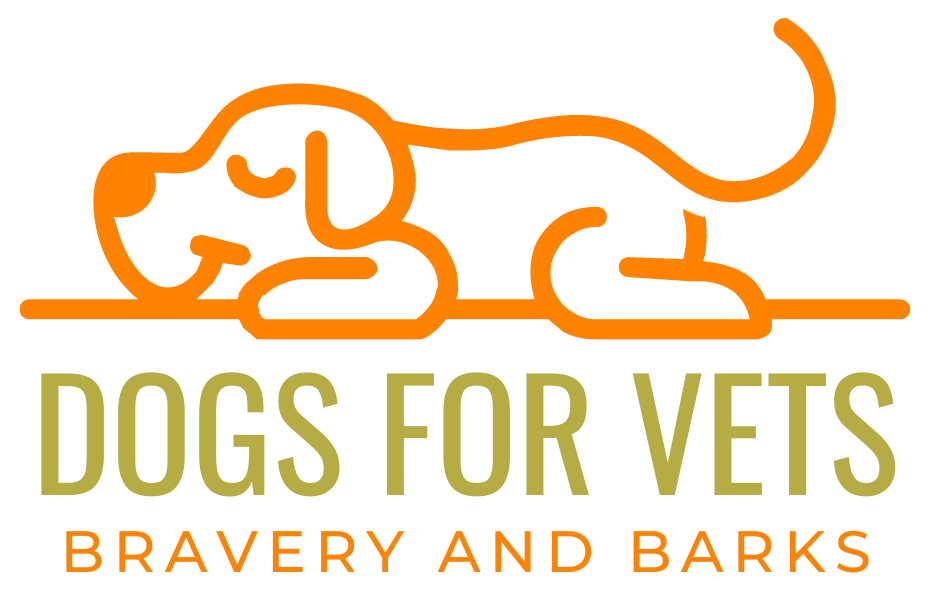This post may contain ads and affiliate links and we may earn a small commission when you click on the links at no additional cost to you. As an Amazon Affiliate, we earn from qualifying purchases. You can read our full disclaimer here.
Problems with Older Dogs: Understanding Age-Related Challenges
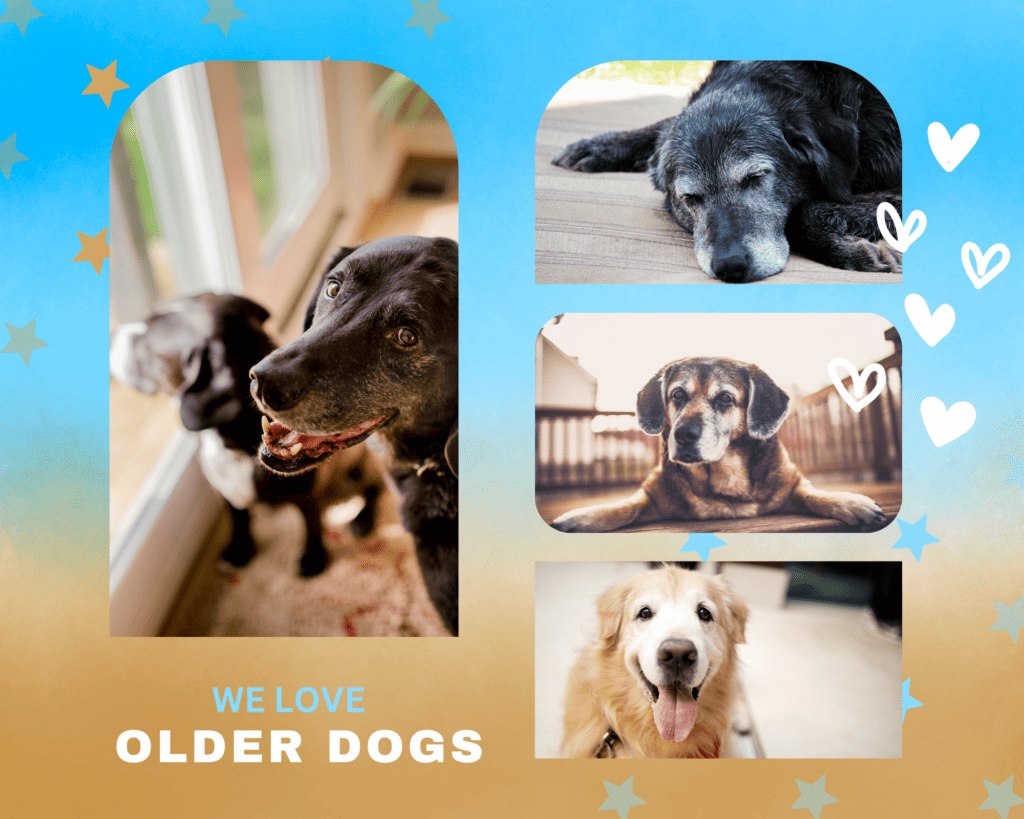
Problems with older dogs can range from health issues to changes in behavior, much like what we see in aging humans.
As our beloved dogs enter their senior years, it’s crucial for us, as their owners, to understand and adapt to these changes. This understanding is key to maintaining their quality of life and ensuring they remain happy and comfortable.
You might start noticing signs like decreased energy levels, less enthusiasm for long walks, or a general slowdown in their daily activities. These changes are natural as dogs age, but they signal that it’s time for us to adjust their care routine.
It’s about being sensitive to their needs and making sure they’re still enjoying their day-to-day life, even if it’s at a slower pace.
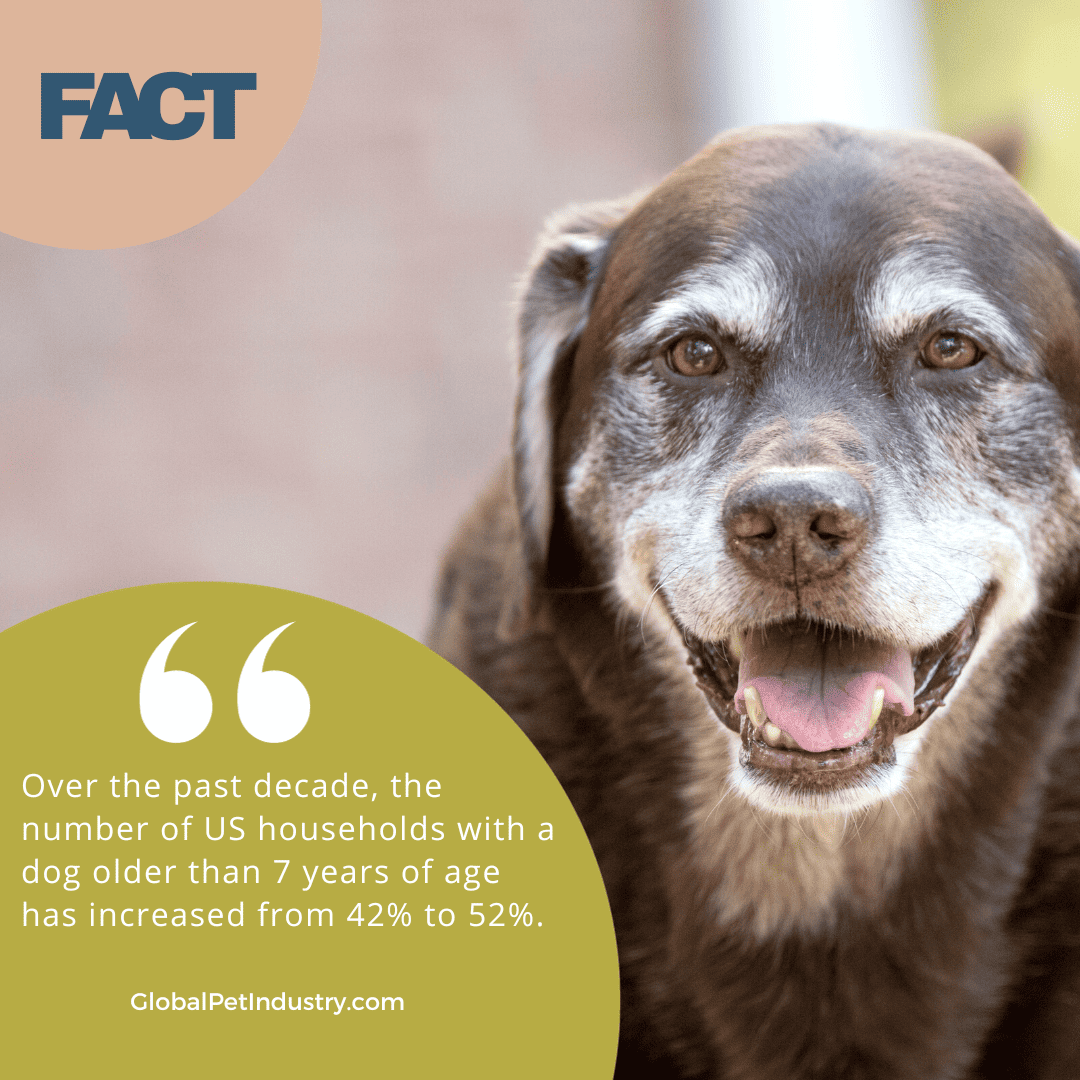
Keeping an eye out for these signs of aging is essential. If your dog seems more lethargic or is moving more cautiously, it’s not necessarily cause for alarm, but it is a prompt for us to modify our approach.
This could mean shorter, more frequent walks, a more comfortable sleeping area, or just a bit more patience and understanding.
It’s all about supporting them through their senior years and ensuring they continue to live happily and healthily.
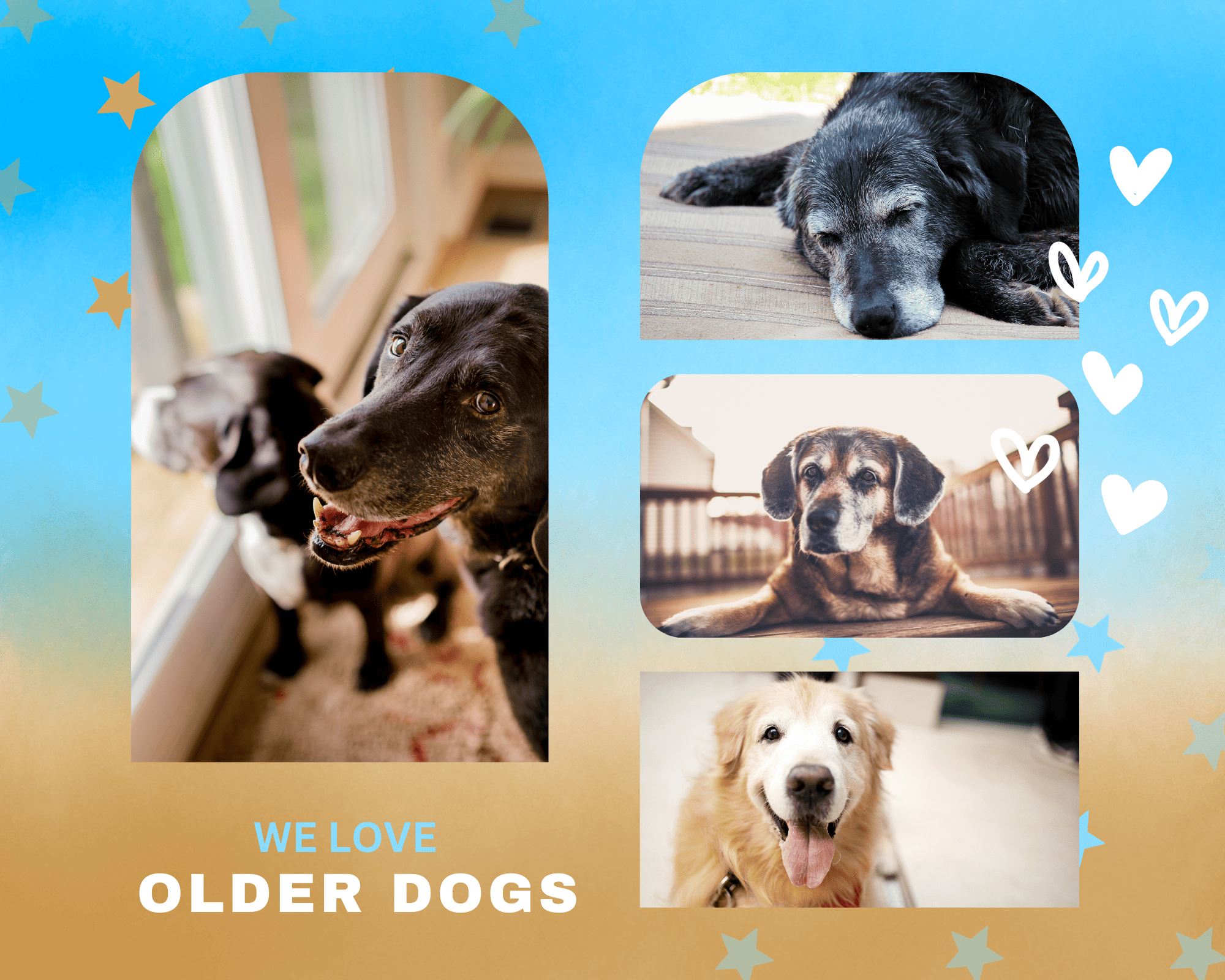
Staying attuned to the evolving needs of your senior dog involves adapting their diet, exercise, and environment. Aging affects their dietary requirements, and tweaks in nutrition can help manage weight and support joint health.
Exercise remains important for older dogs but should be tailored to their reduced stamina and potential joint issues.
Mental health is just as important as physical health; cognitive function can decline, resulting in noticeable changes in behavior.
Key Takeaways of Problems with Older Dogs
- Monitoring and adapting to changes in your senior dog’s health and behavior is essential.
- Adjustments in diet, exercise, and living environment can enhance your older dog’s well-being.
- Regular veterinary check-ups ensure proper health management and address age-related concerns.
Recognizing Aging in Dogs
As your dog advances in years, familiarizing yourself with the signs of aging is critical for maintaining their health and well-being.
You will notice both physical and mental changes, including slower movements and decreased sensory abilities, which are natural parts of the aging process.
Identifying Common Health Issues and Problems with Older Dogs
Aging in dogs brings about several health issues that require your attention. Senior dogs, typically considered so at around 6-7 years for larger breeds and closer to 10 for smaller breeds, can face a range of medical problems.
- Arthritis: Stiffness or reluctance to move may indicate joint pain.
- Kidney Disease: Excessive thirst and changes in urination are signs to watch for.
- Cancer: Unexplained weight loss or lumps on the body should be inspected by a vet.
- Diabetes: Symptoms include excessive thirst, increased urination, and weight loss.
- Dental Disease: Bad breath or difficulty eating could be signs of dental issues.
- Hypothyroidism: Look out for signs like weight gain and lethargy.
- Urinary Tract Disease: Any changes in urination patterns warrant a vet visit.
Note that these are not exhaustive of all possible conditions, but they are among the most common.
Behavioral Changes and Problems with Older Dogs
Behavioral shifts in your senior dog can also be a result of the aging process. Cognitive dysfunction, similar to Alzheimer’s in humans, can manifest in various ways.
- Memory Loss: Your dog may forget familiar routes or commands.
- Hearing and Vision Loss: A decreased response to auditory cues or difficulty navigating around the house might occur.
- Canine Cognitive Dysfunction Syndrome: Disorientation and changes in social interactions can be signs.
It’s essential to monitor your senior dog’s behavior closely and consult with a veterinarian if you observe any significant changes.
As their immune system also weakens, they become more susceptible to illnesses, making regular check-ups an important aspect of their care.
Veterinary Care for Aging Dogs
Proper veterinary care is crucial as your dog ages. Seniors often need more attention, and regular check-ups can detect problems early on.
Routine Examinations and Blood Work for Problems with Older Dogs
Your senior dog should have routine veterinary exams at least once a year. These exams often include:
- Bloodwork: To assess organ function and detect conditions such as diabetes or kidney issues.
- Urinalysis: Important for diagnosing urinary tract infections, kidney disease, or diabetes.
- Fecal Exam: Checks for parasites, which seniors are more susceptible to due to their aging immune systems.
Diagnosing and Treating Common Senior Dog Diseases
Familiarize yourself with symptoms like increased thirst, weight loss, or changes in urination habits, and report these to your veterinarian.
Common senior dog diseases that require diagnosis and treatment include:
- Arthritis: Look for signs like difficulty in moving or reluctance to exercise.
- Dental Issues: Bad breath or difficulty eating can be signs of dental disease.
- Cognitive Dysfunction: Behavioral changes may indicate cognitive decline.
Your veterinarian will outline a treatment plan that could include medications, therapy, or lifestyle changes.
Medication and Supplement Management for Problems with Older Dogs
As your dog ages, they may require medications or supplements to treat or manage various conditions. It is vital to follow your veterinarian’s guidance on all medication and supplement dosages.
Keep in mind:
- Regular Monitoring: Some medications need periodic blood tests to ensure proper dosage and monitor side effects.
- Adjustments: Your dog’s medication or supplement needs may change over time; regular vet visits help keep track of this.
Diet and Nutrition for Senior Dogs
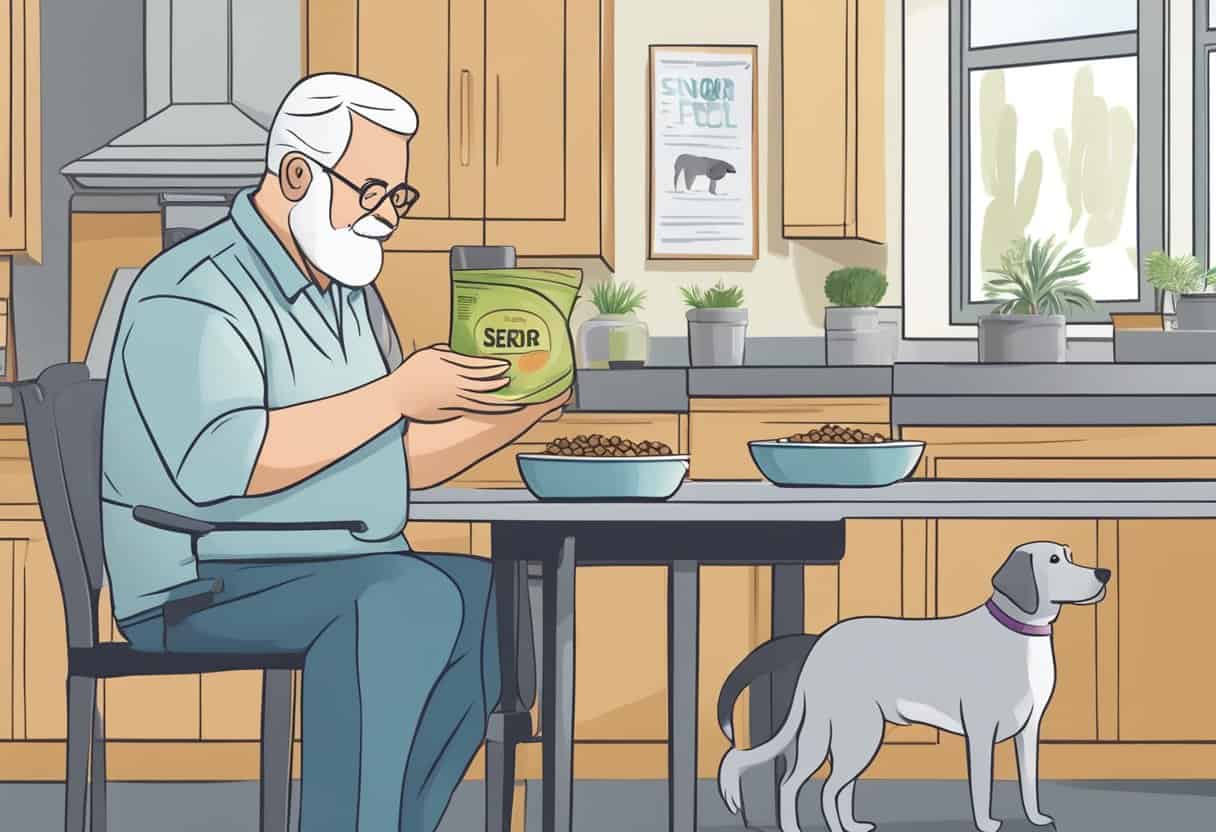
As your dog enters its senior years, its dietary needs will shift. Proper nutrition can help manage weight and cater to the changing health requirements of an aging dog.
Addressing Weight Gain and Loss
Your senior dog may experience weight gain due to decreased activity levels, necessitating a lower-calorie diet to maintain a healthy weight.
Conversely, weight loss can occur, sometimes caused by a loss of appetite or decreased ability to absorb nutrients.
It’s important to ensure your dog’s diet is less calorie-dense but still provides all the essential nutrients.
- Weight Gain: Implement a diet lower in calories but rich in fiber to support gastrointestinal health.
- Weight Loss: If your dog is losing weight, consult a veterinarian to rule out medical issues and to adjust the diet as needed, possibly with higher calorie options that are easy to digest.
Ready for more information? Read our post about signs your senior dog is healthy.
Special Dietary Considerations for Problems with Older Dogs
Senior dogs may have special dietary needs to address specific health concerns:
- Joint Health: Look for foods containing supplements like glucosamine and chondroitin to support joint health.
- Dental Hygiene: Dental hygiene can affect an aging dog’s nutrition if dental issues make eating painful. Consider integrating dental care into routine healthcare and choosing foods that help maintain dental hygiene.
- Cognitive Function: Nutrients like antioxidants may be beneficial for cognitive health as your dog ages.
Regular veterinary check-ups can help tailor your dog’s diet to its specific needs in its senior years.
Physical Activity and Exercise for Problems with Older Dogs
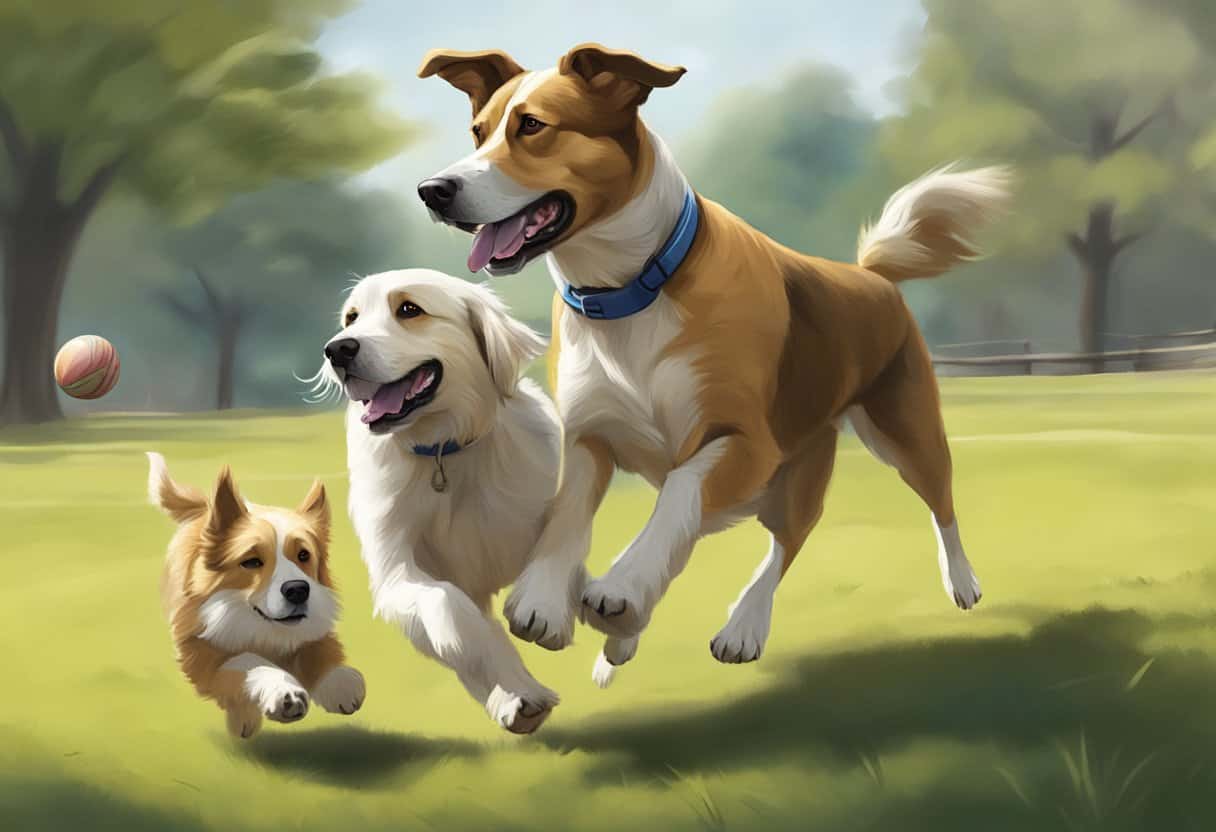
As dogs age, their physical capabilities and stamina change. Adapting your dog’s exercise routine and providing therapies for joint health becomes crucial to maintain their quality of life.
Adapting Exercise Routines for Older Dogs
Your senior dog’s exercise routine will require adjustments to match their current endurance and mobility levels. One key is to focus on low-impact activities that reduce stress on their joints.
Walking provides moderate exercise, while swimming can be an excellent way to maintain muscle mass with minimal impact. Incorporate activities that encourage range of motion and flexibility, such as gentle stretching.
To monitor their condition, pay attention to signs of tiredness, such as heavy breathing or reluctance to move, indicating it’s time to rest.
- Exercise examples:
- Shorter, more frequent walks
- Swimming in a controlled environment
- Gentle playtime with soft toys
Therapies for Mobility and Joint Health
Therapies can also improve mobility and joint health in older dogs. Massage therapy and acupuncture have been shown to alleviate discomfort and enhance circulation.
Considerations like an orthopedic dog bed can provide better sleep posture and relieve pressure on sore joints. For dogs with osteoarthritis or significant mobility issues, consulting with a veterinarian about specific physical therapies or supportive devices may bring additional relief.
- Supportive measures:
- Regular massages to soothe stiff muscles
- Acupuncture for pain management
- Orthopedic bedding to support joints during rest
Mental Health and Cognitive Function
As dogs age, they may experience a decline in mental health, exhibiting signs of confusion, memory loss, and learning difficulties. This can often be a manifestation of Cognitive Dysfunction Syndrome (CDS), a condition akin to dementia in humans.
Managing Cognitive Dysfunction Syndrome
Cognitive Dysfunction Syndrome (CDS) is a degenerative neurological disorder in older dogs that can lead to symptoms such as disorientation, confusion, and memory issues.
As your dog ages, you may notice behaviors that indicate CDS, including:
- Pacing back and forth without purpose
- Repetitive movements
- Changes in sleep-wake cycles
- Decreased interest in play
- Increased irritability
To manage these symptoms, it’s essential to consult with a veterinarian to discuss potential treatments. These might include medication, dietary adjustments, and specific therapeutic strategies tailored to your dog’s needs.
Don’t miss our guide about fostering senior dogs.
Environmental Enrichment and Training for Problems with Older Dogs
Environmental enrichment is crucial to support the mental health of older dogs. Cognitive decline may be managed to some extent by keeping your dog’s environment stimulating and engaging. Consider these strategies:
- Introduce new toys that stimulate problem-solving.
- Maintain regular exercise appropriate for your dog’s age and health.
- Practice training exercises to reinforce learning and memory.
For dogs showing signs of cognitive dysfunction, simple, repetitive training exercises can help maintain cognitive function and slow the progression of symptoms.
In summary, you can play a pivotal role in addressing and managing cognitive decline in dogs through medical intervention, a stimulating environment, and continual training.
Problems with Older Dogs: Behavioral and Psychological Changes

As your dog ages, you may observe alterations in behavior and psychological state, which can include increased anxiety, fear, confusion, and disorientation.
Changes in sleep patterns and vocalization are also common. Understanding and managing these shifts can help maintain your dog’s quality of life.
Handling Anxiety and Stress
Older dogs often experience increased anxiety and stress. Symptoms like restlessness, constant pacing, or even unexpected aggression can indicate heightened stress levels. To help manage this anxiety:
- Create a calm environment: Maintain a quiet and comfortable space for your dog to retreat.
- Stick to routines: Regular schedules for feeding, walks, and playtime can provide stability.
Dealing with Disorientation and Sleep Patterns
Disorientation in senior dogs can manifest as seeming forgetfulness, wandering, or appearing lost in familiar settings. To minimize confusion:
- Keep the home layout consistent to avoid further disorientation.
- Aid Navigation: Use night lights to help your dog navigate the home during the night.
Sleep-wake cycles can change, leading to more vocalization or activity at night. To support healthy sleep patterns:
- Encourage activity during the day: This can help tire them out and promote better sleep at night.
- Provide comfort: A cozy bed in a quiet, familiar area can encourage restfulness.
Home and Environment Adaptations
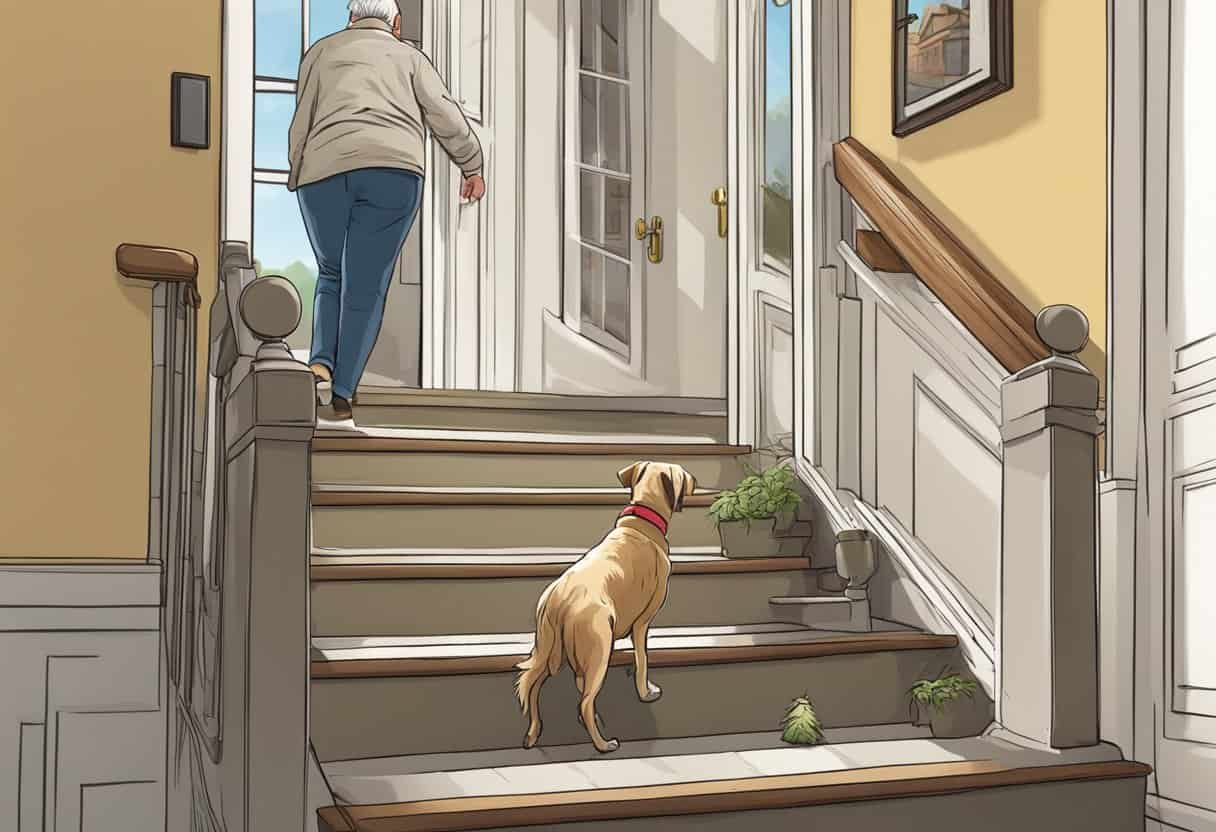
As your dog enters its senior years, maintaining a safe and comfortable home environment becomes crucial.
Sight and mobility issues mean that even familiar spaces can become challenging, and sticking to a routine provides security and stability.
Making the Home Safe and Comfortable
To help your senior dog navigate their living space safely, consider the following:
- Flooring: Install non-slip surfaces such as yoga mats or rugs with grippers to prevent slipping, especially in high-traffic areas.
- Furniture: Rearrange furniture to create clear pathways for your dog to move around freely, reducing the risk of injury.
- Bedding: Provide orthopedic beds to support aging joints and ensure they are easily accessible, without the need to jump or climb.
Routine and Familiarity
- Consistency: Keep your dog’s environment and daily schedule consistent; this helps decrease stress and confusion in senior dogs who may have diminishing vision or hearing.
- Task Cues: Maintain routine cues for daily tasks like feeding or going outside, which can help a dog with fading sight maintain a sense of normalcy and happiness.
Special Considerations for Health Management
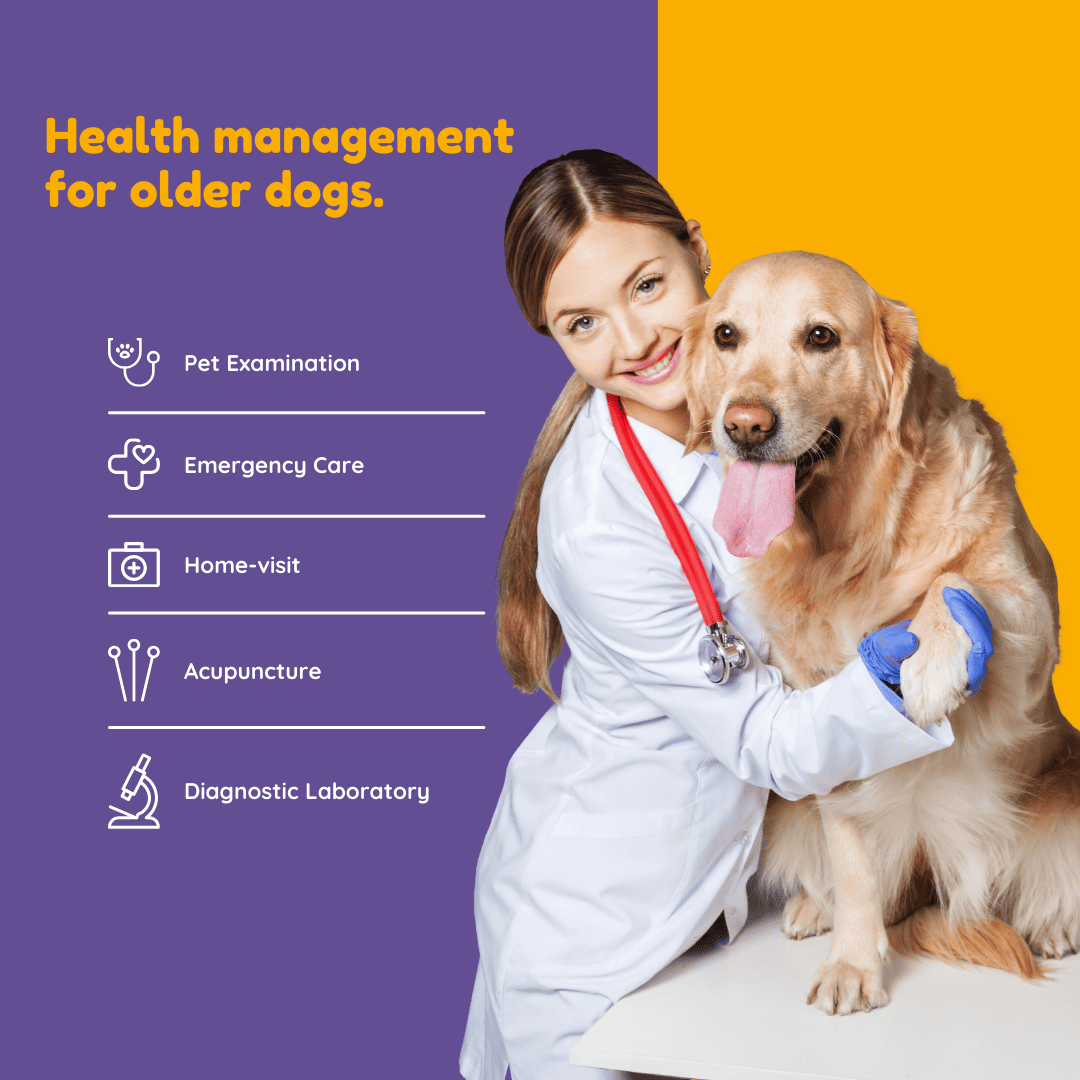
As your dog ages, vigilant health management becomes critical with chronic diseases and continence often requiring special attention and care.
Chronic Disease Monitoring
Your senior dog can be prone to chronic conditions such as kidney and heart disease. Kidney disease can lead to increased thirst and urination, weight loss, and a decrease in appetite.
Regular blood work and urine analysis are essential for tracking kidney function, especially considering chronic kidney disease is a progressive condition that can be managed but not cured.
Heart disease can manifest through coughing, difficulty breathing, or reduced ability to exercise. Early detection and appropriate treatment can improve your dog’s quality of life.
Therefore, regular veterinary check-ups are key in early identification and management of these health issues.
Continence Care and Management
Continence issues can be distressing for you and your dog. Incontinence, or a lack of bladder control, is common in aging dogs, and may be a sign of underlying health problems such as urinary tract infections or diseases.
Observe for any signs of incontinence and consult a vet promptly for accurate diagnosis and treatment. Solutions may include:
- Environmental management: easy access to the outdoors or pee pads for frequent urination.
- Medication: prescribing drugs that strengthen bladder control.
- Diet: tailored nutrition to support bladder health and manage weight.
Regular dental assessments are also vital, as dental disease can cause pain and lead to systemic issues, including those affecting the urinary tract.
Remember to address any pain promptly, because it can be a sign of various conditions, from urinary tract disease to underlying causes such as arthritis.
End-of-Life Care
When your aging dog reaches the end of life, focusing on comfortable care and maintaining well-being becomes a priority. The options for palliative care and improving quality of life during these final stages are essential considerations.
Palliative Care Options for Problems with Older Dogs
Pain Management:
- Medications: Your vet may prescribe anti-inflammatories, analgesics, or other medications to manage pain effectively.
- Supplements: Incorporation of glucosamine, chondroitin, and omega-3 fatty acids can support joint health and reduce discomfort.
Cancer Care:
- Treatments: Depending on the cancer type, chemotherapy, radiation, or surgery might be recommended.
- Holistic Therapies: Alongside conventional treatments, acupuncture or massage may offer additional relief.
Comfort Measures:
- Bedding: Provide a warm, orthopedic bed to ease joint pain.
- Accessibility: Keep essentials within easy reach to minimize movement discomfort.
Supporting Quality of Life in the Final Stages
Environmental Adjustments:
- Keep living areas quiet and stress-free to support your dog’s emotional well-being.
- Ensure easy access to food, water, and a comfortable resting area.
Nutritional Support:
- Choose specially formulated foods that are easy to digest and appeal to your dog’s changing appetite.
- Hydration: Make sure fresh water is always available to prevent dehydration and support organ function.
Vet Visits:
- Regular check-ups: Maintain close communication with your vet for ongoing assessment of your dog’s condition.
- Palliative care plans should be adjusted as needed to respond to your dog’s changing needs.
Frequently Asked Questions about Problems with Older Dogs
As your dog ages, certain issues may arise that are indicative of declining health or behavioral changes. Being aware of these signs and knowing when to seek veterinary assistance is crucial for their well-being.
What are common signs of anxiety in senior dogs?
Your older dog may display anxiety through increased vocalization, pacing, or destructive behavior. It’s important to recognize these signs and provide a comfortable environment to alleviate stress.
How can I address my older dog’s night restlessness?
To help your older dog sleep better at night, establish a routine that includes plenty of daytime activities and a comfortable sleeping area. Consult your vet if restlessness persists, as it may be a health-related concern.
When should I be concerned about my senior dog’s weight loss?
Significant weight loss in your senior dog could be a symptom of underlying health issues. If you notice a decrease in weight, it’s important to consult your veterinarian to rule out serious conditions.
What are the options for managing aggression in elderly dogs?
If your elderly dog shows aggression, it’s essential to determine the cause. Pain management, behavior modification, and environmental adjustments are often effective, but professional guidance from a veterinarian or animal behaviorist is recommended.
How can I tell if my senior dog is in pain or suffering?
Pain in senior dogs can manifest as reluctance to move, changes in eating habits, or unusual vocalization. Observing behavior and seeking prompt veterinary care when pain is suspected can help manage their comfort.
What constitutes old age in dogs, and what health issues are prevalent at this stage?
Old age in dogs varies by size and breed; smaller breeds tend to live longer. Common health issues in older dogs include joint problems, hearing and vision loss, and organ failure.
Regular veterinary check-ups can help monitor and manage these conditions.
Conclusion of Problems with Older Dogs
As your dog reaches its senior years, you’ll likely notice a variety of health and behavioral changes.
Common health challenges include arthritis, reduced mobility, dental issues, and the potential onset of more serious conditions such as cancer or organ dysfunctions.
- Arthritis and Mobility Issues: Pain management and joint supplements can aid your dog’s comfort and mobility.
- Sensory Decline: Hearing and vision loss can affect your dog’s behavior; accommodations may help them cope.
- Dental Health: Regular dental care is crucial to prevent disease and discomfort.
Blood and urine tests can disclose the status of your dog’s internal functions, important as kidney function often declines with age.
Recognizing and addressing these changes early ensures your pet maintains the best possible quality of life.
Maintain regular veterinary check-ups to monitor the evolution of your dog’s health. Together with guidance from your vet, you can make more informed decisions about your senior dog’s care, potentially extending their lifespan and enhancing their well-being.
-

Coffee Mug – In Dog Coffees I’ve Only Had One
$11.95 – $14.95 Select options This product has multiple variants. The options may be chosen on the product page
